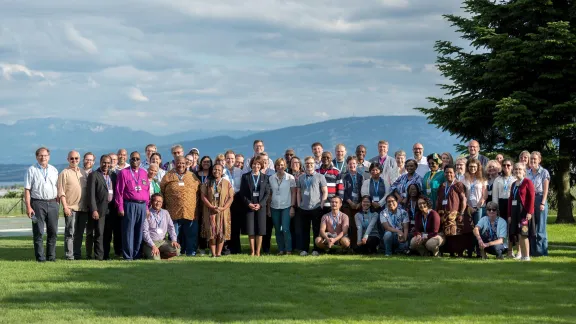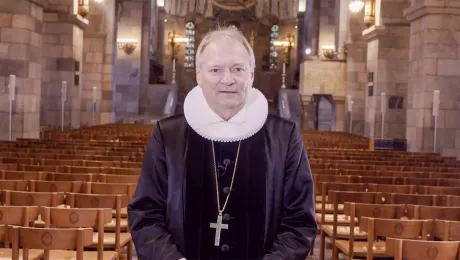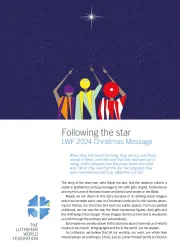
Participants in Pre-Council meetings for Youth, Women and Men in Chavannes-de-Bogis, outside Geneva, Switzerland. Photo: LWF/Albin Hillert
Participants focus on strengthening intergenerational cooperation and gender justice
(LWI) – At separate Youth, Women’s and Men’s Pre-Council meetings, delegates from The Lutheran World Federation (LWF) member churches around the world emphasized the need for strengthening dialogue, while modelling attentive listening and intergenerational cooperation to ensure meaningful participation and shape “a future that is fair, just, and full of life” for the Lutheran communion.
Participants met on 12 June ahead of the 13-18 June Council meeting at Chavannes-de-Bogis, just outside Geneva, under the theme “Abound in Hope.”
Important to dream big
The youth session brought together a dozen young women and men from around the globe to prepare their Council participation, zeroing in on key priorities for the work of the LWF in the Communion’s new strategic period. The meeting took place against the backdrop of issues highlighted by youth at the Kraków assembly, including the evermore urgent need for climate justice, strengthening gender justice, youth leadership and intergenerational understanding.
Isabella Reimann Gnas of the Evangelical Church of the Lutheran Confession in Brazil, a young Council member and LWF vice president for Latin America and the Caribbean, reflected on the importance of the LWF’s commitment to establish an intergenerational policy, as mandated by the Kraków assembly. “It will be so important to create a structure where all can be present and play a part. This is a new start, a new beginning in a way,” Reimann Gnas reflected.
Tim Götz of the Evangelical Lutheran Church in Bavaria echoed her words: “This is a big step, with the LWF being perhaps the first major organization to introduce such a policy. Once it is in place, we need to ensure it can be implemented at all levels.” He continued: “We also need to prioritize the advocacy work of young people: in a world of conflict and authoritarianism, young people can be an important voice for climate justice, gender justice, and overcoming other divisive issues,” Götz said. “To build a peaceful world: this is a big dream, but big dreams are also important,” Reimann Gnas added.
”For every new Council member, it is important to have an opportunity to be in dialogue and to reflect on how priorities are being applied in the work of the communion,” noted Savanna Sullivan, LWF Program Executive for Youth. “Not least for youth, this Pre-Council is an opportunity to come together to discuss both what is going well, and what needs to change, at the global level,” Sullivan added.
Irrespective of whether it concerns climate justice, finance or ecumenical dialogues, gender justice is always an intersectional matter.
Rev. Dr Arnfríður Guðmundsdóttir, LWF Vice-President for the Nordic Region
At the Women’s Pre-Council meeting, participants looked back at decisions made at the Kraków Assembly and Women’s Pre-Assembly regarding the LWF’s programmatic work on Gender Justice and Women’s Empowerment. They reflected on strategies for effective participation in the Council and shared experiences from their respective churches.
Another aspect stressed during the meeting was the inclusion of gender justice as an integral part of the LWF’s upcoming study processes. “The LWF’s gender justice work is based on theological reflection,” said Rev. Dr Marcia Blasi, Program Executive for Gender Justice and Women’s Empowerment. “It is part of our Lutheran identity.” She highlighted that gender justice is not only a concern for women, “but for all members of communities, churches and the global communion.”
Rev. Dr Arnfríður Guðmundsdóttir from The Evangelical Lutheran Church of Iceland, Vice-President for the Nordic Region, reminded fellow Council members that gender justice is a cross-cutting issue. “Irrespective of whether it concerns climate justice, finance or ecumenical dialogues, it is always an intersectional matter.”
Modelling positive masculinities
The Men’s Pre-Council meeting was the first of its kind, following on from the inaugural men’s Pre-Assembly in Kraków. It brought together participants from LWF member churches around the world to reflect on directions set at the Assembly and suggest practical ways of developing more just relations among men, women and youth.
Delegates reflected on the identity and participation of men in the life of the church and society, with particular attention to power relations and the formation of positive masculinities. They strongly endorsed the need to create spaces where men can share together, not as leaders and problem solvers, but as individuals with weaknesses and vulnerabilities. “Recognizing our limitations,” one delegate noted, “is the first step” towards developing a more collaborative mindset.
Rev. Dr Sivin Kit, LWF’s Director for Theology, Mission and Justice, who facilitated the men’s meeting, said: “It was significant to hear how men from different regions shared openly about the importance of modelling a positive masculinity that is Christ-like.”
Participants also shared hopes for closer collaboration with younger men and women in the work of strengthening gender justice and intergenerational justice. They recognized the significant steps achieved through the quotas that encourage empowerment and meaningful participation of women and youth in the LWF. Yet, they acknowledged that this is not fully reflected in many member churches. They stressed that collaboration and solidarity with women and youth is key to overcoming paternalistic approaches and attitudes.
“This meeting has been an important step in in promoting a more attentive listening by men in the church, as well as in families and in wider society.” Kit added.
The LWF has set a gender participation quota of 40 percent female, 40 percent male and 20 percent youth in its governing bodies and other structures to ensure balanced representation. Delegates at all the Pre-Council meetings represented churches in all the seven regions of the LWF.
The Council is the annual governing body of the LWF. Its 13-18 June meeting is taking place in Chavannes-de-Bogis near Geneva under the theme “Abound in Hope.” The 2024 meeting is the first full gathering of the Council, which consists of 48 members, the President and the Chairperson of the Finance Committee.


